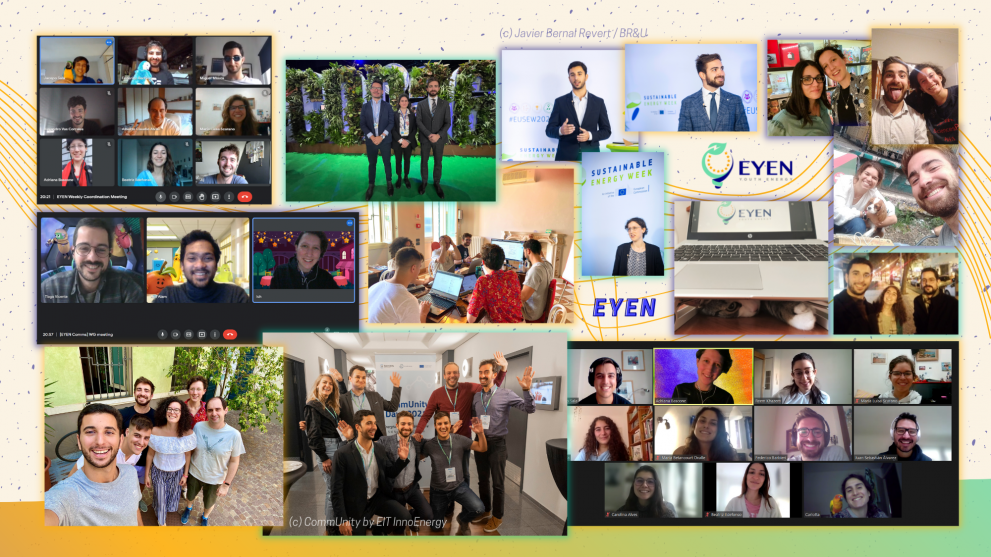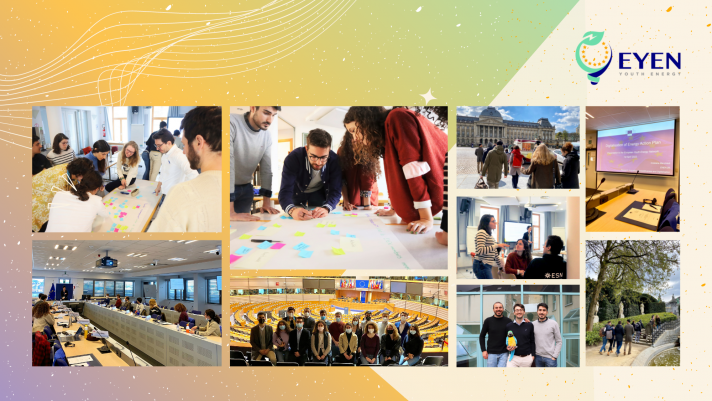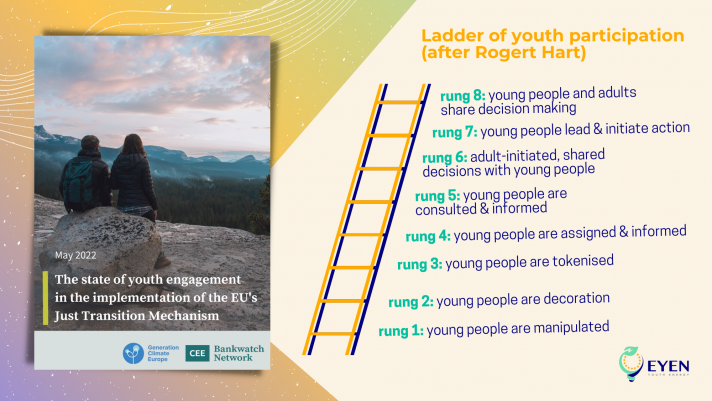
It’s high time we all stopped underestimating the crucial role of civil society, marginalised groups and youth in the (energy) transition. Over the last few years, ambitious youth organisations have emerged with the aim to unify the voice of young people in different sectors of the sustainability transition on the European continent.
These are three of them:
- The European Youth Energy Network (EYEN), the federation representing youth energy-focused organisations across Europe;
- Generation Climate Europe (GCE), the coalition of youth-led networks on climate change issues at the European level;
- Youth and Environment Europe (YEE), the European network of environmental - national and regional - youth non-profit organisations.
EYEN, GCE and YEE share a core characteristic: they are independent organisations who represent their members towards a strong and coordinated voice of youth in EU decision-making. Motivated by the will to connect young people during COVID-times and galvanised by the opportunities and open space of the European Year of Youth 2022, they are becoming more engaged and well-known within the “EU bubble”, while maintaining a strong connection with national and local realities.
Despite focusing on different angles of our transition to a net-zero emissions economy (respectively energy, climate and environment), the synergies between these three networks become even more evident when dealing with socio-economic realities such as Just Transition or Intergenerational Justice. And they all address the systemic lack of consideration for youth. This is important, because in a world of unfair systems, multiple insecurities, lack of quality jobs and ingrained exclusion, young people are fighting for a future. Every single day.
WHY A JUST TRANSITION NEEDS YOUTH-LED NETWORKS: REPRESENTATION, COMMUNICATION AND SOLUTION-BUILDING AS THE KEYS TO YOUTH ENGAGEMENT
In EYEN we believe that all decision-making processes need to put inclusion and fair representation first. This is especially urgent for the sectors that will require drastic transformations to achieve the climate objectives set by the international and European community and that will shape the future of today's youth, like energy. Youth, in all of their diverse and dynamic groups, are key to finding the solutions. This is because of their long-term vision, state-of-the-art skills (with competence from communication to digitalisation), their ability to bridge different languages of institutions and youth and their effectiveness in collaborating with stakeholders and getting key messages across. Also, nobody knows their needs better than young people themselves. In a world where young people consistently fail to access the institutions, they rely on youth organisations and networks to convey their message.
If properly funded and organised, youth networks can constitute a very efficient bridge between citizens and institutions. These organisations are naturally characterised by the ability to engage and mobilise groups of individuals, both young citizens and adults, by raising awareness over a specific topic (e.g. energy transition) and the need to have citizens actively participating in it. They would not only report about the status of youth participation in the different Member States, but also constitute great communication channels for those institutions that always struggle or do not have a great outreach capacity towards their citizens. They provide precious insights into youth and its views on policies that will affect the years to come. This can take place through advocacy: bringing inputs on a policy, with their position papers and reaction pieces to legislative initiatives and significant events, and their engagement in public consultations at several levels of EU policy.
At the same time, youth networks can also co-create (instead of just disseminating) opportunities and engagement mechanisms and make young people’s voice heard over the lack of specific engagement activities of the state authorities. And they can empower youth by also contributing to the sharing of information and valuable skills (e.g. through skills workshops).
But let’s look at the elephant in the room: youth is still far from being represented enough.
LACK OF YOUTH ENGAGEMENT IN THE EUROPEAN JUST TRANSITION
It is often complicated to properly assess the level of youth engagement within a certain field, but we can say for sure that it’s been insufficient. Back in 1997, sociologist Roger Hart wrote a book for UNICEF in which he provided guidance on the cooperation between young people and adults in community development and environmental care. Hart introduced the concept of the "Ladder of Youth Participation” which establishes eight different degrees of young citizens’ engagement.
An example of this can be seen in the European regions under the Just Transition Mechanism. This regional development programme of the European Union aims at supporting decarbonisation in those regions whose economy depends on the production or consumption of fossil fuels through new low-emission economic activities and the reskilling workers currently employed in fossil fuels-related sectors. As GCE uncovered in its joint report from May 2022, “young generations have not been considered by state authorities as a key stakeholder to approach for the writing of TJTPs” - the Territorial Just Transition Plans prepared by Member States to access EU funding. Other examples of the lack of youth engagement in the EU’s policy initiatives range from ineffective public consultations that only enable external feedback on already consolidated drafts, to a more diffused lack of transparency and communication in the publication of the various drafts that are made available to the public.
HOW TO ADDRESS THE LACK OF YOUTH ENGAGEMENT: MEASURE, IMPLEMENT, FUND AND MONITOR
To address the current chronic lack of youth engagement, we need youth of different backgrounds to be represented everywhere - in diverse forums and institutions, with access to high-level meetings, roundtables, conferences, committees, discussion forums, the European institutions as a start for more institutional engagement later, green youth employment and professional opportunities including paid internships. Most crucially, giving youth the ability to work on those policies that most influence their lives and future.
We also need to have dedicated mechanisms in place from the beginning of a partnership and from the first steps of a new legislative initiative. In this respect, including youth as an active voice in the impact assessments that are presented together with any new legislation that is proposed at the EU level is fundamental to retrieve data of how policies affect and might affect youth and broaden the spectrum of participation in the making of new laws. Youth representatives have to be treated as equals to all stakeholders - as defined in the “Toolkit for the participation of youth in the JTF” of the European Commission. The sharing of information with youth must be more transparent and efficient, and aimed at engagement and participation. Moreover, new funding schemes for grassroots movements are necessary. A recent positive example is the “EUTeens4Green” grant launched by DG REGIO that will finance around 70-100 engagement projects powered by youth in the regions targeted by the Just Transition Mechanism.
THE UNIQUE ROLE OF THE EUROPEAN YOUTH ENERGY NETWORK (EYEN)
Before EYEN, there was no official association in Brussels representing the views and providing the perspective of young people in the energy transition. So in 2020, we started building up the first and only federation uniting energy-focused youth organisations across Europe and reshaping youth engagement in the European energy transition. For that, we focus on the intersection between youth and energy policies within the European Union, with our intercultural team of young professionals and students from all across Europe.
Our ambitions are driven by five strategic objectives, crucial to achieve our mission:
- ADVOCACY - Advocating for the meaningful and effective inclusion of youth in the energy transition.
- COORDINATION - Coordinating youth energy-focused organisations through the creation of an enabling environment for cross-organisational cooperation.
- CONNECTION - Closing the gap between institutions relevant to the energy transition and energy-focused youth organisations. We do that by facilitating the access to opportunities both on EU level (e.g. Youth Energy Day, as part of the European Sustainable Energy Week) and on the national level (e.g. Energy Stakeholders Dialogues).
- EMPOWERMENT - Boosting youth-energy focused organisations on European, national and local levels. This can be achieved by acquiring and distributing knowledge and financial resources, hence becoming a key source of support for those organisations.
- EDUCATION - Educating students, young professionals and other citizens on the energy transition. Under this objective, we currently disseminate workshops and educational sessions organised by our Members.
BEST PRACTICES OF EYEN’S MEMBERS
Fuelled by the enthusiasm of existing youth organisations, there is no better way of demonstrating further practices and concrete actions from young energy leaders than by showcasing the activities of some of our EYEN Members.
- Young Leaders in Energy and Sustainability (YES-Europe): Created through an initiative of the EPFL University of Lausanne in Switzerland in 2016, YES-Europe has built a European community for youth - young professionals and students - to discussion and form their own informed opinions, develop ideas, take responsibility, build their local communities and act for change. One example of their numerous initiatives are the “Energy Apéros”, for which they bring together experts to debate a controversial and current topic in the energy sphere, such as hydrogen and nuclear power.
- Future Energy Leaders Portugal (FEL.PT): Based on the World Energy Council’s FEL-100 program, FEL.PT provides a platform for the energy leaders of tomorrow to build a rich professional network and to interact with senior energy leaders in Portugal and across the world. To name a specific initiative towards accelerating the energy transition, they organise a cycle of events called "Energia em Debate" with the aim of demystifying "hot topics", such as energy poverty and energy access in the residential sector.
- Student Conference "Energy Efficiency and Sustainable Development" (SCEESD): The North Macedonian student organisation raises awareness and develops potential on issues concerning energy efficiency and sustainable development. Its main target group arec undergraduate and postgraduate engineering students, , academic members and companies working in close relation to these topics. As a key activity, the organisation is celebrating its upcoming 10th student conference which will be held physically in October 2022. The conference will offer opportunities for collaboration between university students from North Macedonia and abroad, eminent professors and young professionals.
We are especially grateful for the contributions of our founding members YES-Europe (Young Leaders in Energy and Sustainability Europe), Young Energy Specialists and Development Cooperation (YES-DC), PIaneta, ELIES (Energy Leaders in Environment and Sustainability) as well as our Founding Partners Student Energy and and the SDG7 Youth Constituency.
Recommended articles and sources:
- The state of youth engagement in the implementation of the EU's Just Transition Mechanism https://gceurope.org/wp-content/uploads/2022/05/REPORT.-The-state-of-youth-engagement-in-the-implementation-of-the-EU-Just-Transition-Mechanism-May-2022.pdf
- Youth for a just transition - A toolkit for youth participation in the just transition fund (by the European Commission; with examples of youth engagement methods in co-creation, implementation and monitoring phases of activities) https://op.europa.eu/en/publication-detail/-/publication/c4b1f9ca-643e-11eb-aeb5-01aa75ed71a1/language-en/format-PDF/source-189601671
- European Youth Forum’s Policy Library - Youth Participation https://tools.youthforum.org/policy-library/youth-participation/
- Youth Participation Research, SALTO Participation and Information Resource Centre https://participationpool.eu/resource-category/youth-participation/understanding-participation/participation-research/
- EU Youth Strategy https://europa.eu/youth/strategy_en
- News articles of the European Youth Energy Network: https://youthenergy.eu/news-articles/
- Visit EYEN’s website https://youthenergy.eu/join-eyen/ to find out how to contribute to the federation as a volunteer, member or partner.
About the author:
Adriana Bascone is the Communications Coordinator of EYEN, where she works on leading and building a strong team toward youth engagement in the European energy transition. She has years of experience in communications and project management, with a strong background in everything from social media to strategy, branding, design and great texts. As an ambitious creative and communicator for social impact, she is currently also a Communications Leader in the global organisation Ashoka, that has developed the field of “social entrepreneurship” since 1980 as well as the first and largest community of system-changing social entrepreneurs. She studied Environmental Management and previously worked in energy and industrial fields. Now more than ever, Adriana is passionate about EYEN’s targeted and professional approach to provide solutions and allow youth (organisations) to be heard in the energy field. And she believes that we can only successfully change society with the help of better communication.
Disclaimer: This article is a contribution from a partner. All rights reserved.
Neither the European Commission nor any person acting on behalf of the Commission is responsible for the use that might be made of the information in the article. The opinions expressed are those of the author(s) only and should not be considered as representative of the European Commission’s official position.
RELATED ARTICLES:
➔ How EUSEW 2022 is planning for a brighter energy future: the young protagonist
➔ How you can unleash the power of our recent European social innovation!
➔ Engage youth to accelerate the energy transition: 3 ways to go beyond rhetoric
Details
- Publication date
- 12 July 2022
- Author
- European Climate, Infrastructure and Environment Executive Agency


